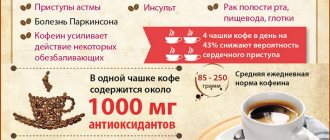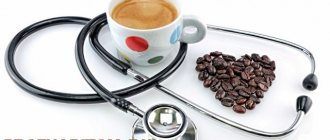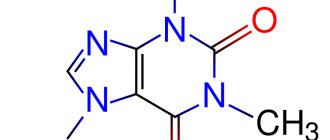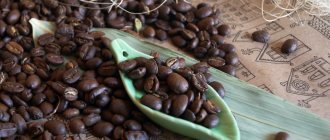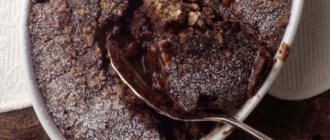Is it possible to drink coffee when you have a cold?
Doctors usually recommend avoiding coffee during illness, as it can increase the load on the heart, and tachycardia is harmful to a weakened body. In addition, caffeine dehydrates the body, so there is a risk that the patient will not drink enough fluids, in which case the drink will actually be harmful. Another reason is to increase vigor, and when you have a cold, it is advisable to rest more, fall asleep, etc. It is easier for doctors to prohibit than to explain the rules and hope for the patient’s consciousness.
However, not so long ago scientists recognized that coffee can be beneficial for colds: it contains many biologically active substances (chlorogenic acid and its derivatives), which are an antiviral agent. In addition, caffeine is in some way a diuretic, which means that if you drink a lot of liquid in addition to it, toxins will be more actively removed from the body.
One or two cups a day will not hurt, and will even help fight the disease and improve the overall tone of the body. Considering that many people suffer from illness while working, your favorite drink will give you energy and help you concentrate on important matters and tasks.
You can only drink coffee if you have a cold if the temperature does not rise above 37.5 - 38 degrees. In this case, it will really negatively affect the heart. But when the peak of the disease passes and the temperature drops, you can brew yourself a cup again.
What kind of coffee can you drink when you have a cold?
Only freshly ground and freshly brewed coffee, from which the active substances have not yet evaporated, has all the beneficial properties. It is better to brew it weakly, you can add various spices, or even make a special “anti-cold” coffee.
- Coffee with cinnamon . It is especially useful if you need to restore strength after a high fever has subsided, or at the beginning of an illness, when you just feel a sore throat and sore throat.
- Coffee with cardamom . Cardamom is an almost obligatory component of most cough mixtures. It not only has a positive effect on the heart, but also improves the tone of the entire body.
- Coffee with star anise . Star anise, also known as anise, has been familiar to many since childhood precisely because it is included in most cough mixtures. Anise soothes coughs, relieves hoarseness, and can even restore your voice.
- Coffee with lemon and honey . Helps remove swelling from the face, clear the airways, and improve immunity. The drink should not be strong, and lemon and honey should be added to a warm, not hot drink.
Instant coffee drink is harmful, especially for a sick, weakened body. Avoid it, it won't do any good and may only make your symptoms worse.
“The bread smelled like vinegar.”
In October, Dmitry's family fell ill: weakness, aches, and high fever appeared. The guesses were confirmed by the results of tests for COVID-19. The loss of smell, traditional for coronavirus, manifested itself only in the mother. For the youngest man and his father, the smells did not disappear anywhere, and on the third day olfactory hallucinations appeared.
“My father came up to me with suspicions that the bread was somehow spoiled, that there was something wrong with it, a very strange smell. I smelled the bread and felt that it smelled something different, something between vinegar and acetone. Within two days, everything began to smell so different. Dad also developed such strange smells,” Dmitry explained in a conversation with Moscow 24.
The smell probably lingered for a day or two. I heard him even without any attempts to sniff anything, he just stood there. You understand with your brain that you smell a smell that is not there, that nothing here smells like that. There was some tension because of this, because it was unclear how long this story would last. Dmitriy
got sick with coronavirus
A few days later, according to the young man, everything returned to normal. “But if you inhaled deeply, notes of this aroma appeared, but it was the nose that did not treat anything. My father’s normal sense of smell returned faster,” added Dmitry.
According to research published in the Journal of the American Medical Association (JAMA), only 49% of COVID-19 patients who lost their sense of taste or smell fully recovered these functions only a month after recovery. In 40%, improvement was recorded, but not complete recovery, and in 10%, even after a month, taste and smell do not return.
Users of social networks also talk about the whole palette of scents. “I have a constant, persistent smell of sulfur. A month has passed, but I can’t smell or taste anything. I feel like I’m being haunted by the smell of some nasty thing like ammonia and formaldehyde,” one woman wrote.
Others complain that they are haunted by the smell of a burnt dinosaur; others often smell tobacco smoke anywhere after an illness.
Photo: depositphotos/AndrewLozovyi
Coffee recipe for colds
If you feel like you’re starting to get sick, have a sore throat, a cough or runny nose, support your body with this healthy drink made from available ingredients.
Pour coffee into a Turk (to make a weak drink), fill it with ice water and put it on the fire. You need to remove it when a head of foam just begins to form. Add salt and ground red pepper on the tip of a knife, as well as 2-3 grams of butter. Return to the heat again until foam appears, pour into a cup and drink in small sips.
Keep in mind that this is a drink for an incipient cold, and if the sore throat is serious, it is better to choose a less “burning” recipe. And be careful in the evening, the “anti-cold” drink noticeably invigorates, and it is recommended to drink it 5-6 hours before bedtime.
Conclusion
- You can drink coffee for a cold if the patient’s temperature does not rise above 38 degrees;
- Chlorogenic acid contained in coffee is a natural antiviral agent;
- Be sure to drink plenty of other fluids when you are sick, and caffeine will help flush out toxins along with it;
- Instant coffee is harmful, it is better to drink natural, freshly ground and freshly brewed coffee, and make it weak;
- Add spices, lemon or honey to your coffee - they will help restore strength and recover faster.
Honey does not help with colds, but coffee helps avoid cirrhosis: 15 myths about your favorite foods
We all know that you should eat porridge for breakfast, when you get sick you should drink milk with honey, and to grow up you should eat more carrots. Stop. What if all these attitudes from childhood are nothing more than just myths? Let's figure it out together with the Wildsoda company and pediatrician Maria Chakhnashvili.
Useful Mela newsletter twice a week: Tuesday and Friday
SUBSCRIBE
Myths about “healthy” products
Porridge for breakfast
Breakfast is the main meal of the day, so it should be hearty and substantial. And porridge is actually not the worst option. Slow carbohydrates are important for the body. But the ideal breakfast is a mixture of carbohydrates and proteins. Moreover, it is better to choose proteins for breakfast with a low fat content.
Honey and fruit juice help with colds
There are still no studies confirming this fact, so it is impossible to say that drinks with honey, ginger, lemon or berries will somehow save you from a cold. Another thing is that when you have a cold, it is advised to drink as much liquid as possible, but what exactly will be in this liquid - berries or honey - is not so important. The only thing to be wary of is a large amount of sugar: it reduces the ability of immune cells to kill harmful microorganisms. Therefore, when you have a cold, it is best to drink water, unsweetened tea, or bone broth.
Snacks from fruits and bars
You just need to be careful with the bars; many of them contain either sugar or sweet fruits (dates, for example). Fruits are always a good idea, but it is better to give preference to low-fructose ones (citruses, pineapple, kiwi), and slightly reduce the amount of high-fructose ones (grapes, dates, figs, watermelon, persimmons).
red fish
It is better not to overuse salted fish, but instead of salmon, take coho salmon and chum salmon: they are rich in vitamin D and omegas. And don’t neglect herring: it’s low in calories, and, importantly, it’s very affordable. The downside is that herring is salted, so you shouldn’t eat it more than once a week. In the store, look for the thickest fish, it contains more fatty acids. And a clever life hack: add pesto sauce to the fish so that it doesn’t turn out dry.
Red meat steaks
Meat is an important component for a child’s menu. What should you pay attention to when choosing a product? First of all, on the supplier: sometimes it is not the meat itself that is dangerous, but the product that the animal was fed on the farm. Cows are often fed grain rather than grass. And the grain is gluten. Of course, gluten intolerance is a very rare disease; inflammation after gluten ingestion occurs in only 0.05% of the world's inhabitants.
It is best for children to cook turkey, beef and rabbit dishes. And, of course, you should avoid grilling and frying. Cooking, steaming, stewing, baking are healthier.
Vegetables are not always healthy
Boiled beets, carrots and corn have a high glycemic index, that is, when these products are consumed, glucose enters the blood faster, which means its jump in the body will be very sharp. But in their raw form there is no need to be afraid of these products. On the contrary, this is an excellent replacement for the same chips.
Myths about “harmful” foods
Potatoes are harmful
Everyone is now talking about how harmful starch is. Its main source is potatoes. But don’t rush to give it up! For example, in jacket potatoes, after cooling, the starch turns into a resistant form and becomes a probiotic.
Frozen vegetables and berries
They are no worse than fresh ones: shock freezing allows you to preserve a maximum of vitamins and microelements, and it is also a great way to please yourself with out-of-season berries and vegetables.
Low-fat diet
In the 80s, nutritionists and everyone who wanted to lose weight waged a real war on fat. It’s good that these myths about the dangers of fat have long been dispelled. Fat is the main source of energy for the brain and the whole body; without it, there will be no hormones that ensure youth, and vitamins that cannot be synthesized in our body. The breadth of consequences of low-fat diets is frightening: from frequent colds to prolapse of internal organs. A significant portion of fats should come from sources of omega-3 acids (fish oil, fish, flaxseed oil). The diet should include extra virgin olive oil, avocado and nuts, tofu.
And don’t forget about lard, it contains a balanced amount of omega-3, omega-6 and omega-9. Vitamins A, D, E, selenium, lecithin - as a bonus. But be careful: lard cannot be fried; at high temperatures, the product becomes toxic and even carcinogenic.
Pancakes
Eh, remember how your mother or grandmother baked lush pancakes in childhood, and then ate them with sour cream or, if you were lucky, condensed milk? You shouldn’t deny yourself your favorite dish; you can choose a slightly different recipe that will make it a little healthier:
- Banana roll pancakes (with honey). Take 1 banana, 1 egg, 1-2 tbsp. spoons of ground traditional Hercules. Mash with a fork or put in a blender. Fry in ghee or in a dry frying pan.
- Zucchini-buckwheat pancakes. Take 1 small zucchini, 1 egg, 1-2 tbsp. spoons of buckwheat flour (or buckwheat ground in a coffee grinder). Fry in melted butter and serve with red fish. Healthy and satisfying breakfast!
Coffee
The dangers and benefits of coffee have been debated for a long time. To date, several of its beneficial properties have been proven:
- Reduces the risk of Parkinson's disease
- Reduces the risk of melanoma
- Drinking coffee reduces the risk of developing liver cirrhosis
- Coffee improves thinking processes, so drinking it is one of many possible ways to prevent dementia
Lemonade
The main harm of all lemonades known to us is the high sugar content. But sometimes you really want to drink a cool and refreshing drink! What to do? The Wilsoda company invented and implemented “healthy lemonade”: it is made from real fruits, and, most importantly, there is no sugar at all.

